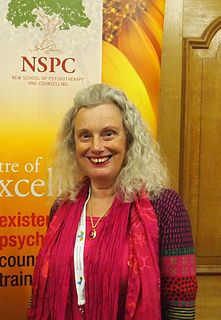This page is based on this
Wikipedia article Text is available under the
CC BY-SA 4.0 license; additional terms may apply.
Images, videos and audio are available under their respective licenses.

Existentialism is the philosophical study that begins with the human subject—not merely the thinking subject, but the acting, feeling, living human individual. It is associated mainly with certain 19th and 20th-century European philosophers who, despite profound doctrinal differences, shared the belief in that beginning of philosophical thinking.
Psychotherapy is the use of psychological methods, particularly when based on regular personal interaction, to help a person change behavior and overcome problems in desired ways. Psychotherapy aims to improve an individual's well-being and mental health, to resolve or mitigate troublesome behaviors, beliefs, compulsions, thoughts, or emotions, and to improve relationships and social skills. Certain psychotherapies are considered evidence-based for treating some diagnosed mental disorders. Others have been criticized as pseudoscience.
Group psychotherapy or group therapy is a form of psychotherapy in which one or more therapists treat a small group of clients together as a group. The term can legitimately refer to any form of psychotherapy when delivered in a group format, including cognitive behavioural therapy or interpersonal therapy, but it is usually applied to psychodynamic group therapy where the group context and group process is explicitly utilised as a mechanism of change by developing, exploring and examining interpersonal relationships within the group.

Rollo Reese May was an American existential psychologist and author of the influential book Love and Will (1969). He is often associated with humanistic psychology, existentialist philosophy and, alongside Viktor Frankl, was a major proponent of existential psychotherapy. The philosopher and theologian Paul Tillich was a close friend who had a significant influence on his work.
Logotherapy was developed by neurologist and psychiatrist Viktor Frankl, on a concept based on the premise that the primary motivational force of an individual is to find a meaning in life. It is considered the "Third Viennese School of Psychotherapy" along with Freud's psychoanalysis and Adler's individual psychology.
Existential humanism is humanism that validates the human subject as struggling for self-knowledge and self-responsibility.

An existential crisis is a moment at which an individual questions if their life has meaning, purpose, or value. It may be commonly, but not necessarily, tied to depression or inevitably negative speculations on purpose in life. This issue of the meaning and purpose of human existence is a major focus of the philosophical tradition of existentialism.

Emmy van Deurzen is an existential therapist. She developed a philosophical therapy based in existential-phenomenology.
Sensitivity training is a form of training with the goal of making people more aware of their own goals as well as their prejudices, and more sensitive to others and to the dynamics of group interaction.

Stephen Jan Ticktin is a Canadian psychiatrist, therapist and lecturer, and a notable figure in the anti-psychiatry movement.

James Frederick Thomas Bugental was one of the predominant theorists and advocates of the Existential-Humanistic Therapy movement. He was a therapist, teacher and writer for over 50 years. He received his Ph.D. from Ohio State University, was named a Fellow of the American Psychological Association in 1955, and was the first recipient of the APA's Division of Humanistic Psychology's Rollo May Award. He held leadership positions in a number of professional organizations, including president of the California State Psychological Association.

Irvin David Yalom is an American existential psychiatrist who is emeritus professor of psychiatry at Stanford University, as well as author of both fiction and nonfiction.
Mental health interventions for children vary with respect to the problem being addressed and to the age and other individual characteristics of the child. Although such interventions share some approaches, treatment methods can be quite different from each other.
Metanoia has been used in psychology since at least the time of American thinker William James to describe a process of fundamental change in the human personality.
Kirk J. Schneider is a psychologist and psychotherapist who has taken a leading role in the advancement of existential-humanistic therapy, and existential-integrative therapy. Schneider is also the current editor of the Journal of Humanistic Psychology. His major books are Existential-Humanistic Therapy (2010), Existential-Integrative Therapy (2008), The Handbook of Humanistic Psychology (2001), The Psychology of Existence (1995), Rediscovery of Awe (2004), Awakening to Awe (2009), and "The Polarized Mind" (2013).
Orthodox psychotherapy refers to "the process of spiritual growth and development" as used in the Eastern Orthodox Church. In this context, it is a theological term rather than medical or psychological term. The term is not limited to traditional psychotherapy used to treat psychological problems, but it rather refers to all people by dealing with their core existential issues. Metropolitan Hierotheos introduced the phrase through his homonymous book.

Existential Psychotherapy is a nonfiction book by the American existential psychiatrist and author Irvin D. Yalom.










